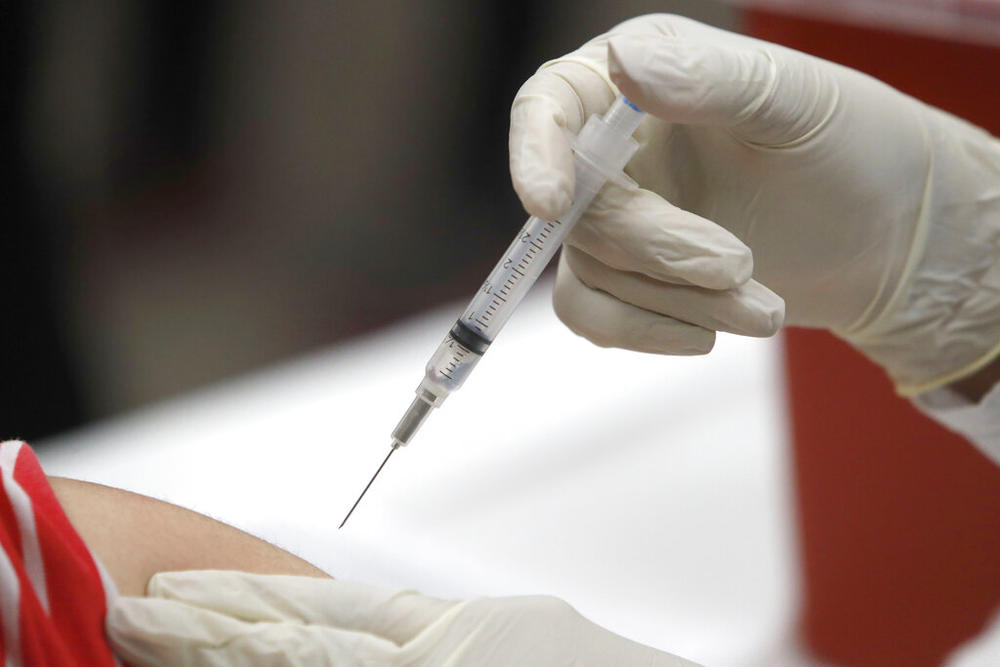
Caption
In this Thursday, Jan. 23, 2020, file photo, a patient receives an influenza vaccine in Mesquite, Texas. Some of the lowest rates of people who receive a flu vaccine are in the Southern U.S.
Credit: AP Photo/LM Otero, File
LISTEN: According to reported flu vaccine uptake in the 2023-2024 season, only about 41% of Georgians got the shot. GPB's Sofi Gratas reports.

In this Thursday, Jan. 23, 2020, file photo, a patient receives an influenza vaccine in Mesquite, Texas. Some of the lowest rates of people who receive a flu vaccine are in the Southern U.S.
Flu season is here, typically lasting between October and May of the following year. The Centers for Disease Control and Prevention recommends anyone six months and older get the flu vaccine, including pregnant people.
Yet, though the flu vaccine is tested, has mild side effects, and is especially good at protecting from severe illness, the number of people getting the shot remains largely unchanged.
According to reported flu vaccine uptake in the 2023-2024 season, only about 41% of Georgians got the shot. That’s below the U.S. average of 47%.
“That's pretty typical, unfortunately, in most states,” said Glen Nowak with the University of Georgia’s Center for Health and Risk Communication.
Nowak said he doesn’t expect Georgia’s vaccination rate to change anytime soon. People who are 65 and older historically make up the highest number of flu vaccinations, and hospitalizations, though there have been some increases in vaccine uptake among younger people.
To reach populations who are historically less interested, Nowak said there would have to be a shift in outreach.
“You're probably not going to be able to solve that problem, in terms of getting higher flu vaccination rates, just with posters,” Nowak said. “People are going to have to be able to access doctors and nurses and health care providers who can educate them about the vaccine and its importance.”
That means making investments to grow primary care access, Nowak said. Because seeing a doctor consistently helps build trust, meaning their recommendations hold more weight.
“That is the most important thing in terms of determining whether someone gets one,” Nowak said.
But that’s a problem for people who live in rural communities. In Georgia, thousands of rural residents face barriers to preventive care, like transportation, internet access and a provider's willingness to see uninsured or underinsured patients. Plus there’s just less doctors in rural communities overall, and some studies show that those who do decide to get the shot increasingly rely on trusted clinicians for vaccinations.
But although there’s evidence that rural residents are likely to get the flu vaccine, there’s still questions about how to change that. It’s not always about attitudes, and research suggests vaccine uptake may have more to do with social determinants of health.
Nowak said above all, most people who decide to get a flu vaccine do so because they’ve experienced the worst of the flu before, or are seeing reports of severe strains that year.
“The best way to protect yourself from becoming severely ill is a flu vaccine,” Nowak said.
But dominating flu strains are subject to change over time, and the flu vaccine is still most effective in people who already have a healthy immune system.
To help solve these problems, hundreds of millions of dollars have gone toward the development of a universal flu vaccine.
Involved in that effort is Ted Ross with the University of Georgia Center for Vaccines and Immunology in the Department of Infectious Diseases.
“We usually pick out a single strain of flu virus that we use to make the vaccine. So it's very effective against a certain subpopulation of flu viruses,” Ross said.
The vaccine in development will be different.
“It’s like a multicolored version of our vaccine so that it will recognize any of the different variants,” Ross said.
In other words, the antibodies in the new vaccine will be able to block multiple strains of the flu virus at once, like a door that’s locked even against a variety of keys.
A universal flu vaccine would only be necessary once every ten years or so, though it would still need to be updated depending on any new strains that pop up. But offering a vaccine on a longer timeline, rather than annually, would help develop herd immunity too, Ross said, boosting protection against the flu overall.
“You would still probably have an annual campaign, but you'd be asking people who didn't get vaccinated to get vaccinated, and the percentage of people they get vaccinated would get larger,” Ross said.
In order for the vaccine to be truly universal, it will have to work in people across demographics, including children, pregnant people and people with chronic illness. Clinical trials are set to start in the next couple of years.